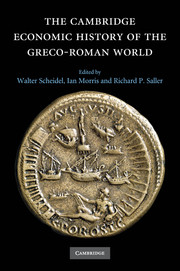Book contents
- Frontmatter
- 1 Introduction
- Part I Determinants of Economic Performance
- Part II Early Mediterranean Economies and the Near East
- Part III Classical Greece
- 12 Classical Greece: Production
- 13 Classical Greece: Distribution
- 14 Classical Greece: Consumption
- Part IV The Hellenistic States
- Part V Early Italy and the Roman Republic
- Part VI The Early Roman Empire
- Part VII Regional Development in the Roman Empire
- Part VIII Epilogue
- Bibliography
- Index
- Map 1.1 The Mediterranean basin"
- Map 10.1 Greek and Phoenician trade in the period of the Persian Wars"
- Map 11.1 The Achaemenid empire"
- Map 12.1 Greece and Asia Minor"
- Map 15.1 The Seleucid empire"
- Map 16.1 Greco-Roman Egypt"
- Map 20.1 The Roman empire at the accession of Vespasian"
- References
12 - Classical Greece: Production
from Part III - Classical Greece
Published online by Cambridge University Press: 28 March 2008
- Frontmatter
- 1 Introduction
- Part I Determinants of Economic Performance
- Part II Early Mediterranean Economies and the Near East
- Part III Classical Greece
- 12 Classical Greece: Production
- 13 Classical Greece: Distribution
- 14 Classical Greece: Consumption
- Part IV The Hellenistic States
- Part V Early Italy and the Roman Republic
- Part VI The Early Roman Empire
- Part VII Regional Development in the Roman Empire
- Part VIII Epilogue
- Bibliography
- Index
- Map 1.1 The Mediterranean basin"
- Map 10.1 Greek and Phoenician trade in the period of the Persian Wars"
- Map 11.1 The Achaemenid empire"
- Map 12.1 Greece and Asia Minor"
- Map 15.1 The Seleucid empire"
- Map 16.1 Greco-Roman Egypt"
- Map 20.1 The Roman empire at the accession of Vespasian"
- References
Summary
the nature of the evidence
More useful evidence for economic activities survives from the fifth and fourth centuries bc, the so-called “classical” period, than from earlier or later periods of Greek history. This and the two following chapters therefore paint a fuller picture, while acknowledging that the evidence remains sketchy and is heavily skewed towards Athens, a region seriously untypical in several respects. The historians’ narratives, indeed, provide little directly usable information, since they focus on political and military matters; but the biographical tradition preserved in Plutarch’s Lives and elsewhere offers some relevant vignettes. More helpful, perhaps surprisingly, are the philosophers and scholars writing in the Socratic tradition – Plato, Xenophon, Aristotle, and Theophrastus – both for the specific information they provide and for their often revealing depictions of attitudes and values. More helpful still, though perilous in so far as its context of utterance was overwhelmingly Athenian, is the surviving corpus of over 100 law-court or public speeches, ascribed (not always accurately) to the major orators and frequently offering information about economic transactions and institutions or on the size and composition of inheritances. However, the most valuable written sources are inscriptions, which proliferate as the two “classical” centuries unfold to encompass far more than the limited pre-500 repertoire of laconic gravestones and one-line dedications. Laws and decrees of state, calendars of sacrifices (often stating the prices of victims), leases of public property, records of property sold or pledged, and especially annual accounts of public financial transactions drawn up and promulgated by state or sanctuary officials, all yield invaluable insight into economic activities and systems.
- Type
- Chapter
- Information
- The Cambridge Economic History of the Greco-Roman World , pp. 331 - 361Publisher: Cambridge University PressPrint publication year: 2007
References
- 15
- Cited by

